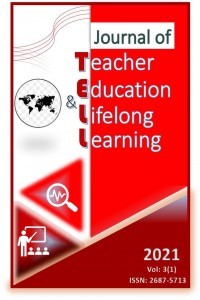Examination of Water Literacy Levels Secondary School Students in Terms of Different Variables
Water Literacy, Water Conservation, Water Sensitivity, Water Awareness, Secondary School Students
Examination of Water Literacy Levels Secondary School Students in Terms of Different Variables
Water Literacy, Water Conservation, Water Sensitivity, Water Awareness, Secondary School Students,
___
- Baltacı, A. (2018). A conceptual review of sampling methods and sample size problems in qualitative research. Bitlis Eren University Social Science Journal, 7(1), 231-274.
- Büyüköztürk, Ş., Kılıç Çakmak, E., Akgün, E, Ö., Karadeniz, Ş., & Demirel, F. (2012). Scientific research methods. Ankara: Pegem.
- Cansaran, A., & Yıldırım, C. (2021). Water and soil resources. In Orçun Bozkurt (Eds.), Environment education, 59-116. Ankara: Pegem.
- Çankaya, C. (2014). Development awareness of pre-service science teachers on sustainable water use.(Unpublished master’s thesis). EskişehirOsmangazi University Education Sciences Institute, Eskişehir.
- Ergin, Ö., Akpınar, E., Küçükcankurtaran, E., & Çoban, Ü. G. (2009). Water awareness: developing teaching material for water education. Project No: 107K291.
- Ekinci, F., Acıelma, F., Küçükseymen, Y., Öztürk, M. B., Kubilay, F., Yelseli, A., & Toprak, F. (2022). Examination of water literacy level of secondary students in terms of different variables (istanbul example). Journal of Current Researches on Social Sciences, 12(1), 51-66.
- Febriani, A. (2017). Water literacy in developing country a case study for indonesia. (Unpublished master’s thesis). Lund University, Sweden.
- Güçlü, Y. (2021). Ecological impact. In Orçun Bozkurt (Eds.), Environment education, 59-116. Ankara: Pegem.
- KalkınmaBakanlığı (2018). Eleventh development plan (2019-2023): Sustainable management of environment and natural resources working group report. Publication No: Kb: 2994 - Öik: 776, Ankara.
- Karasar, N. (2014). Scientific research method. Ankara: Nobel
- Küçük, A. (2022). Investigation of turkish middle and high school students’ water literacy as a factor predicting targets for sustainable development goals. Education Quarterly Reviews, 5(2), 192-201.
- McCarroll, M., & Hamann, H. (2020). What we know about water: a water literacy review. Water, 12(10), 1-28. https://doi.org/10.3390/w12102803.
- Moreno-Guerrero, A.-J., Romero-Rodríguez, J.-M., López-Belmonte, J., & Alonso-García, S. (2020). Flipped learning approach as educational ınnovation in water literacy. Water, 12(2), 1-13. https://doi.org/10.3390/w12020574.
- Özdemir, O. (2017). Ecological literacy and environment education. (2nd Extended Edition). Pegem: Ankara.
- Sherchan, S., Pasha, F., Weinman, B., Nelson, L. F., Sharma, C. F., Therkelsen, J., & Drexler, D. (2016). Seven faculties in search of a mission: a proposed interdisciplinary course on water literacy. Applied Environmental Education & Communication, 15(2), 171-183, DOI: 10.1080/1533015X.2016.1164098
- Sözcü, U. & Türker, A. (2020a). Development of water literacy scale. Third Sector Social Economic Review, 55(2), 1155-1168.
- Sözcü, U. & Türker, A. (2020b). Examining the water literacy levels of high school students according to some variables. Asian Journal of Education and Training, 6, 569-582. Doi: 10.20448/journal.522.2020.63.569.582.
- Şahin, B. (2016). A global problem: water scarcity and virtual water trade. (Unpublished master’s thesis). Hitit University, Social Sciences Institute, Çorum.
- Tian, K., Wang, H., & Wang, Y. (2021). Investigation and evaluation of water literacy of urban residents in china based on data correction method. Water Policy, 23(1), 77–95. doi: https://doi.org/10.2166/wp.2021.160.
- Wang, Y. H. Chang, M. C., & Liou, J. R. (2019). Effects of water-saving education in taiwan on public water knowledge, attitude, and behavior intention change. Water Policy, 21(5), 964–979. doi: https://doi.org/10.2166/wp.2019.173.
- Yentür, M. M., Sözcü, U., &Aydınözü, D. (2022). Determining the water literacy levels of high school students: the case of istanbul. OndokuzMayıs University Journal of Education Faculty, 41(1), 381-421.
- https://www.wwf.org.tr/calismalarimiz/tatli_su/. 12.06.2022 accessed on.
- https://mgm.gov.tr/genel/hidrometeoroloji.aspx?s=3 . 18.07.2022 accessed on.
- ISSN: 2687-5713
- Başlangıç: 2019
- Yayıncı: Ertuğrul USTA
What is Decision Making? What Do Secondary School Students' Mental Images Say?
Lise Öğrencilerinin Coğrafi Bilginin Günlük Yaşama Yansımalarına İlişkin Değerlendirmeleri
Ufuk SÖZCÜ, Abdullah TÜRKER, Erkan DÜNDAR
Teslime DENİZ, Agah Tuğrul KORUCU
Examining the Relationships between Death Anxiety, Meaning in Life, and Parental Attitude
Umay BALTACI, Zeliha TRAŞ, Mehmet AK, Şahin KESİCİ
An inquiry and context-based activity supporting lifelong learning: Enzymes in Daily Life
Fatma ŞAŞMAZÖREN, Feride ŞAHİN
Challenges Faced by Teachers during the Covid-19 Pandemic
Öğretmenlerin Dijital Yeterliliklerinin Farklı Değişkenlere Göre İncelenmesi
